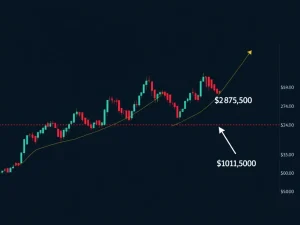Urgent: US Sanctions Crypto Wallet Tied to Dangerous Ransomware Host

The digital world, particularly the crypto space, is constantly under threat from malicious actors. Recent news highlights a significant move by authorities to dismantle the infrastructure supporting these threats. The US Treasury has taken decisive action, imposing US sanctions on a specific crypto wallet and the entities linked to it, aiming to disrupt operations facilitating ransomware and information-stealing attacks.
What is the Aeza Group and Why Were They Sanctioned?
The core target of these sanctions is the Russia-based Aeza Group. According to the Treasury’s Office of Foreign Assets Control (OFAC), Aeza Group operates as a ‘bulletproof hosting’ (BPH) provider. This means they offer specialized servers and technical infrastructure designed to be resilient against law enforcement takedowns, making them ideal for hosting illicit activities.
Aeza Group is accused of actively selling these BPH services to various cybercriminal groups, enabling them to conduct harmful operations like deploying ransomware and stealing sensitive information (infostealers). By providing this crucial infrastructure, Aeza Group allegedly played a key role in the supply chain of major cyber threats.
The Sanctioned Crypto Wallet: An Administrative Hub
Among the sanctioned assets is a specific crypto wallet address on the Tron blockchain. This address, holding approximately $350,000, was identified as an administrative wallet for Aeza Group. Blockchain analytics firms like Chainalysis and TRM Labs played a vital role in tracing its activity.
Analysis revealed this crypto wallet handled various functions:
- Receiving cash-outs from Aeza’s payment processor.
- Forwarding funds to different crypto exchanges.
- Occasionally receiving direct payments for Aeza’s hosting services.
This administrative wallet acted as a central point for managing funds associated with the alleged criminal enterprise, helping Aeza receive payments while attempting to obscure the source through payment processors.
Who Else Was Included in the US Sanctions?
The sanctions extend beyond just the Aeza Group entity and the specific crypto wallet. OFAC also targeted individuals and associated companies:
- Several Russian and UK-based companies linked to Aeza.
- Four Russian nationals identified as executives or part owners of Aeza: Arsenii Aleksandrovich Penzev (CEO), Yurii Meruzhanovich Bozoyan (General Director), Vladimir Vyacheslavovich Gast (Technical Director), and Igor Anatolyevich Knyazev (Part Owner).
OFAC specifically noted Knyazev might be managing the business after Penzev and Bozoyan were reportedly arrested by Russian authorities in connection with the darknet marketplace Blacksprut, which Aeza allegedly hosted.
Broader Impact: Targeting the Ransomware Supply Chain
This action signifies a strategic shift in how law enforcement combats cybercrime. Instead of solely pursuing individual hackers after an attack, authorities are increasingly targeting the foundational infrastructure that enables large-scale operations.
Sanctioning bulletproof hosting providers like Aeza Group disrupts the ‘supply chain’ for cybercriminals. By making it harder for them to find reliable places to host their malicious tools and stolen data, authorities aim to reduce the overall ‘surface area of abuse’ and create pressure points within the cybercrime ecosystem. This mirrors previous actions, such as the US, UK, and Australia sanctioning Zservers for similar activities tied to ransomware like LockBit.
Fighting Cybercrime Infrastructure: A Global Effort
Blockchain intelligence firms emphasize that these sanctions represent a significant step. By targeting hosting providers, governments are attacking the very foundation upon which many major cybercrime operations, including sophisticated ransomware campaigns and widespread infostealer attacks, are built. This ongoing global effort to dismantle criminal infrastructure is crucial for protecting individuals and businesses in the digital age, including those active in the cryptocurrency market who are frequently targets of phishing and malware.
Summary
The US Treasury’s recent US sanctions against the Aeza Group, its executives, and a linked crypto wallet mark a critical development in the fight against cybercrime. By targeting a key provider of bulletproof hosting services, authorities are aiming to disrupt the infrastructure that facilitates ransomware and infostealer attacks. This action highlights the increasing focus on dismantling the support systems for cybercriminals, demonstrating a proactive approach to enhancing digital security and protecting the crypto ecosystem from illicit activities.









